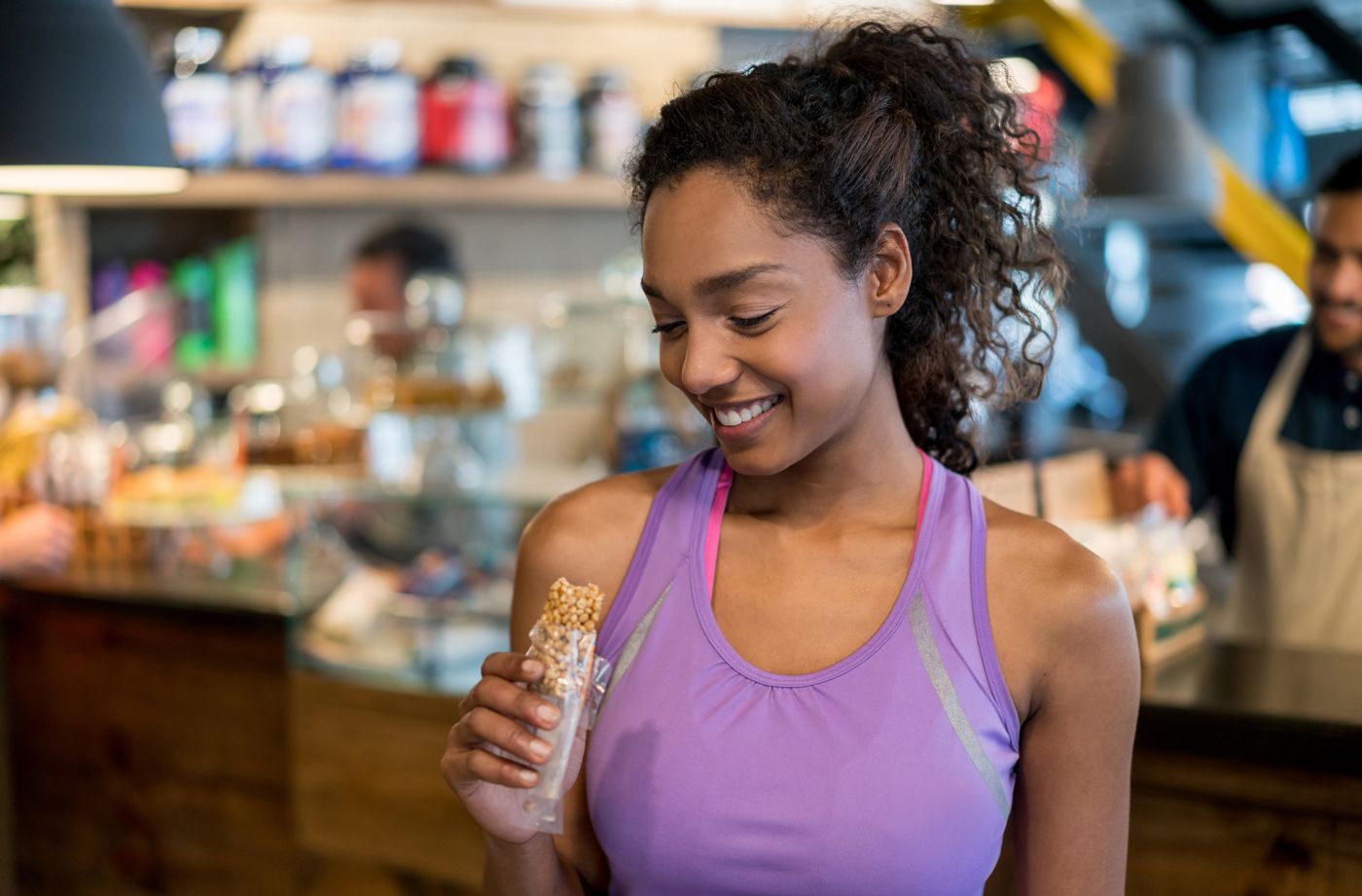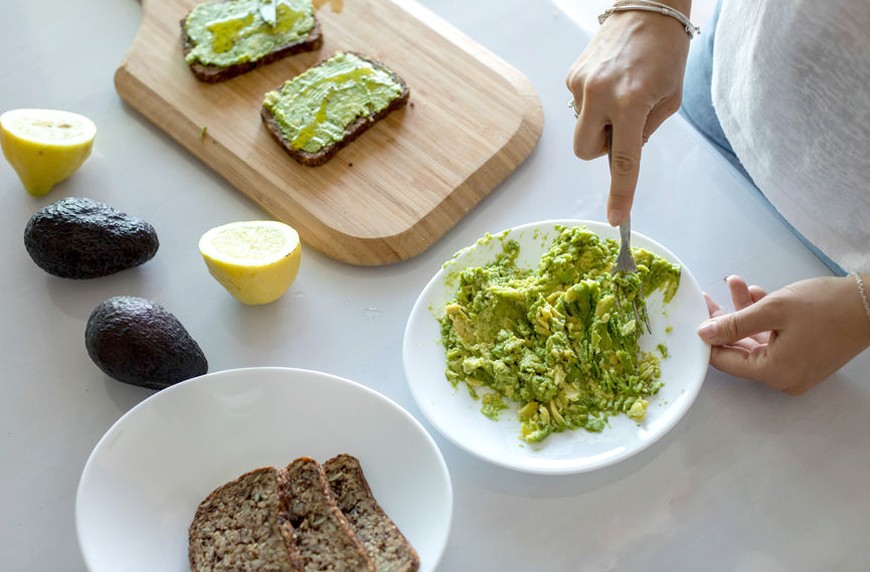How to Fuel Intense Workouts While Sticking to a Vegan Diet
It turns out that no, you don't have to be a carnivore to ensure your fitness game is at peak form. With the right approach, a vegan athlete diet can absolutely fuel your active lifestyle, whether you're training for a marathon or just trying to get to the top of the Flywheel leaderboard.
Here's what you need to know about trying a vegan athlete diet.

The benefits of a vegan athlete diet
One major pro: a plant-based diet is known for being anti-inflammatory, which is good news for everyone. "Red meats, animal fat, and dairy products are high in arachidonic acid, which promotes inflammation in your body," explains celeb-favorite nutritionist Charles Passler, DC, founder of Pure Change. "A balanced vegan diet is vastly lower in that pro-inflammatory substance and is rich in anti-inflammatory fats."
Athletes in particular benefit because of the plentiful antioxidants that come from a plant-based diet. While intense exercise can do some amazing things for your body, it also increases free radical production, which can interfere with an athlete's ability to keep up with a rigorous training schedule. Antioxidants protect against those free radicals, helping keep the body in top form.
"Optimally, your muscle cells primarily depend on mitochondria—the power plants of your cells—to create energy through a process called phosphorylation," says Dr. Passler. "When your cells are attacked by too many free radicals, your mitochondria produce less energy, and your muscle cells start using a process known as anaerobic glycolysis to make up for that energy loss. When you overuse this form of energy production, it creates a buildup of lactic acid in your muscles that will promote muscle fatigue." Not exactly great for your workout.

{{post.sponsorText}}
Antioxidants help counteract this free radical damage, allowing for more mitochondrial energy production, Dr. Passler explains. This means less lactic acid build-up and reduced muscle fatigue. Plus, these antioxidants can help you recover from injuries or wounds more quickly—because free radicals can slow healing time, antioxidants that "quench" these free radicals can play a big role in promoting recovery.
The pitfalls to watch out for with the vegan athlete diet
Of course, a vegan athlete diet does require some strategic planning to make sure you're getting the nutrients you need to fuel your training. For one, getting enough protein can be a challenge. While individual protein needs vary, it's especially important for athletic women to make sure they're getting enough, because protein is considered the "building block" for muscle fiber. Meeting your protein needs allows you to build and maintain muscle mass, as well as help muscle fibers recover from tough workouts.
What's more, many plant-based protein sources aren't complete proteins, or proteins that contain all nine essential amino acids. "The variety of amino acids needed for top muscular performance can only be gotten by very deliberately combing many different plant-based foods," Dr. Passler says.
Other vitamins and nutrients also have to be taken into account when you're considering a vegan diet. "Getting enough vitamin B12, omega-3s, vitamin D, calcium, zinc, iodine, and iron can be a challenge if you aren’t well educated on the plant-based sources of these nutrients and nutritional supplements," says Dr. Passler.
Plus, if you're an athlete, getting enough calories to fuel your training is also important to keep in mind. "The average vegan eats 500 fewer calories than the average meat eater," says Dr. Passler. "Vegan athletes must be extra focused on consuming enough fuel to perform."

Here's what to eat if you're attempting a vegan athlete diet
"Being a vegan doesn’t just mean avoiding meat, cheese, and eggs," says Dr. Passler. "I see far too many people, athletes included, who attempt this new lifestyle and end up eating too many refined carbs, not balancing their proteins, and becoming micronutrient deficient, eventually leading to reduced performance and fatigue."
While these are relevant concerns for any athlete thinking of going vegan, planning ahead and incorporating a variety of nutrient-rich plant-based foods can help check nutrient boxes and fuel your performance.
So, what should you be eating?
First up, let's talk protein. "Beans, lentils, peas, gluten-free grains, basmati rice, and oats are all rich in protein and will provide you with a complete profile of amino acids if you combine them," Dr. Passler says, adding that you wouldn't want to only rely on one type of grain or pulse for all your protein needs. "For example, combining rice with beans creates a complete amino acid profile," says Dr. Passler. Some plant-based protein sources do contain all nine essential amino acids, though—quinoa and buckwheat are good examples.
Foods rich in magnesium and the aforementioned ever-powerful antioxidants should be front-of-mind, too. "Brightly colored plant-based foods like carrots, peppers, tomatoes, oranges, and lemons contain antioxidants that quench free radicals produced during exercise," says Dr. Passler. "Magnesium-rich foods like green leafy vegetables and almonds are great for increasing cellular energy production and reducing muscle cramps."
Healthy fats are also key—think nuts, seeds, avocados, and olives. (Pass the almond butter, please.) They'll help keep your calorie intake up, and they're a great source of anti-inflammatory fats. "Also, algae supplements are great sources of anti-inflammatory omega-3s that are a great addition to a vegan diet," Dr. Passler says.
A vegan athlete diet isn't about what you're not eating—it's about what you are eating. By keeping an eye on your protein intake, your nutrients, and what your plate looks like (the more colorful, the better), you just might notice a major payoff in your athletic performance and your day-to-day life.
If you're on the hunt for some delicious, healthy vegan recipes, try this vegan poke bowl or this avocado-based pasta.
Loading More Posts...